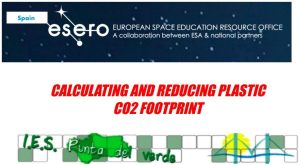Project title: Calculating and reducing plastic CO2 footprint
Team: Punta por el clima
Barrio Nuevo Sevilla Spain 26 Student’s age: 12-13 years old
To what extent reducing and recycling plastic can contribute to reduce climate change?

Firstly we have studied the consumption of plastic in our school comunity and how much (or how less) rubish is classified by students. The group has been divided in different “Green patrols” that has been responsible of observing this.
Secondly we have studied to what extent the use of plastic is responsible for the emission of this gas with greenhouse effect. We have done this consulting what we have considered the most accurate publication about the subject: the publication of the Center for international environmental law: Plastic & Climate: The Hidden Costs of a Plastic Planet published in 2019.
Thirdly we have applied this results to the plastic used by the school comunity to study the specific impact of every single act. To do this we have analized the CO2 footprint of the disposal if the action is taken by only one individual, a full classroom, a full school or even half of Spain population to depict the importance to taking collective action.
Last but not least we will participate en Seville Science Fair. We are now preparing and interesting and interactive stand wher we can show what we have learned and we can convince visitors to join the climate challenge

Let’s try to synthesize our main discoveries with an example.
Let’s imagine the use of an amount of plastic of 1 kilogram. According to our bibliographical resarch. The producction of 1kilogam (1.000 grams) of plastic would emit 1,89 kilograms of CO2. If this is not recycled but incinerated in the disposal we would have to ad 0.90 more kilograms. That would be, in total, 2.79 kg.
We have also been researching how much CO2 we save if plastic is recycled after being used. The figure is not insignificant: 1.40 kg would be saved!. This means that the CO2 footprint of the use of plastic can be from 2,79 kg to only half a kilogram if we think green and we recycle.
After researching these theoretical figures we applied this study to our different real life situations. In this video we will show an example that illustrates how much we can do for the planet.
Let’s take the case of a simple yogurt. With a scale we can measure its weight: 4 grams. Let’s see the impact of this 4 grams of plastic.
Let’s imagine that we have approximately 2 yogurts per week; that is something around 100 in a year. Applying the same calculations as before we have that the ecological CO2 footprint can be from 1.12 kilograms if not recycled to only 200 grams if recycled.1,12 kilograms or 200 grams may not be a big difference in comparison with what we need to reduce but let’s see this.
If we convince half of Spain population to take action, only for a single yogurt we are talking of more than 22 million of kilograms of CO2 or only less than 4 million.
From the 12th to the 14th of May we are going to participate in Seville Science Fair. There, we will help the visitors to do this calculation in a very attractive and interactive stand we are prepparing. There, we will make them think what would happen if he or she is not the only person recycling plastic.
We are going to show them what would happen if it wasn’t only he or she but
-his classrrom (multiplying by 30)
-his full school (multiplying by 500)
-half of the Spain populatino (multiplying by 20 million)
With our research and the publications of our results we expect encourage people to reduce the use of plastics and recycle what they use.
We believe is right time to take action to stop climate change and we believe we can convince many people at our school and in the Science Fair
Projects are created by the teams and they take the full responsibility of the shared data.
← All projects



